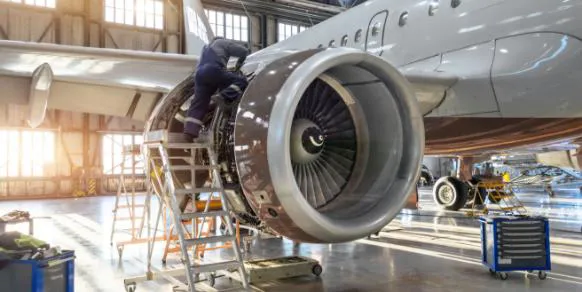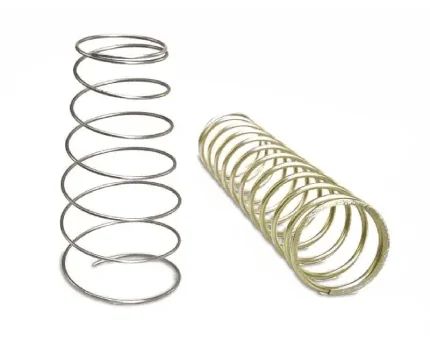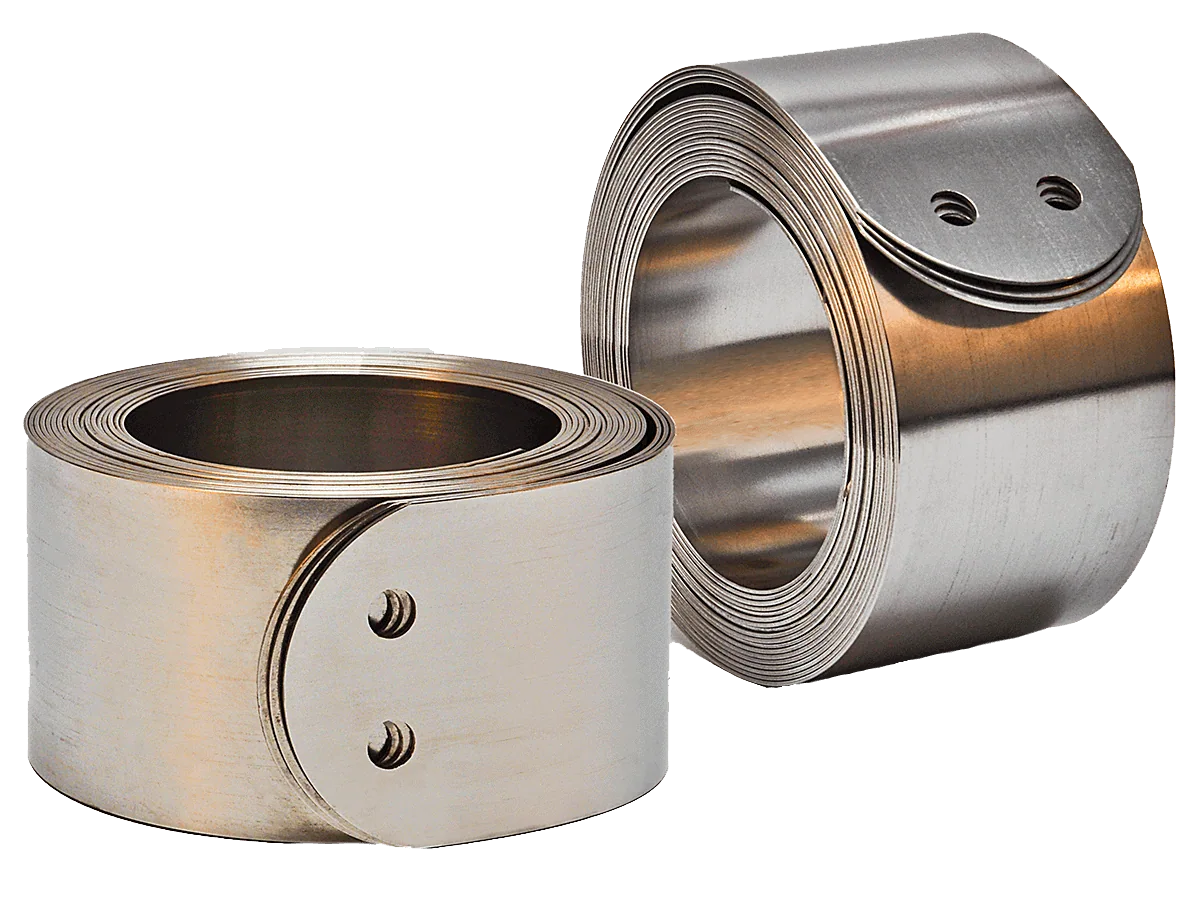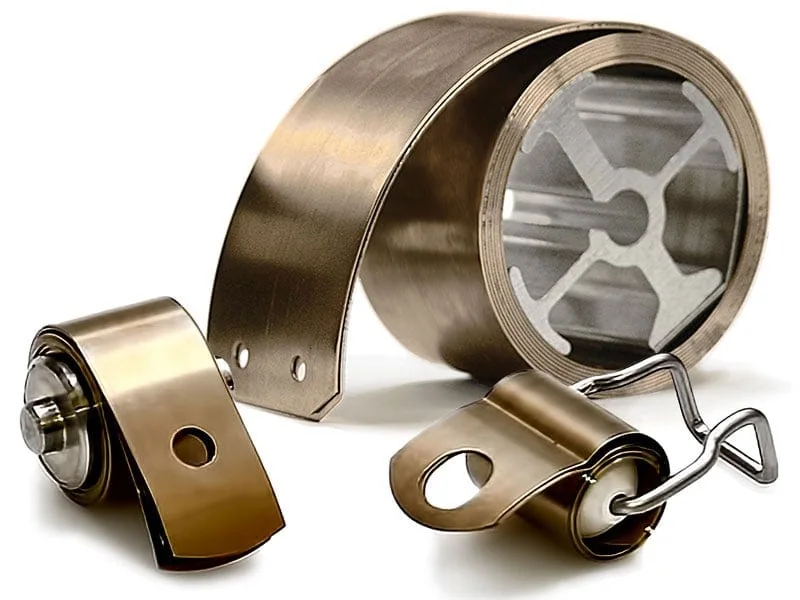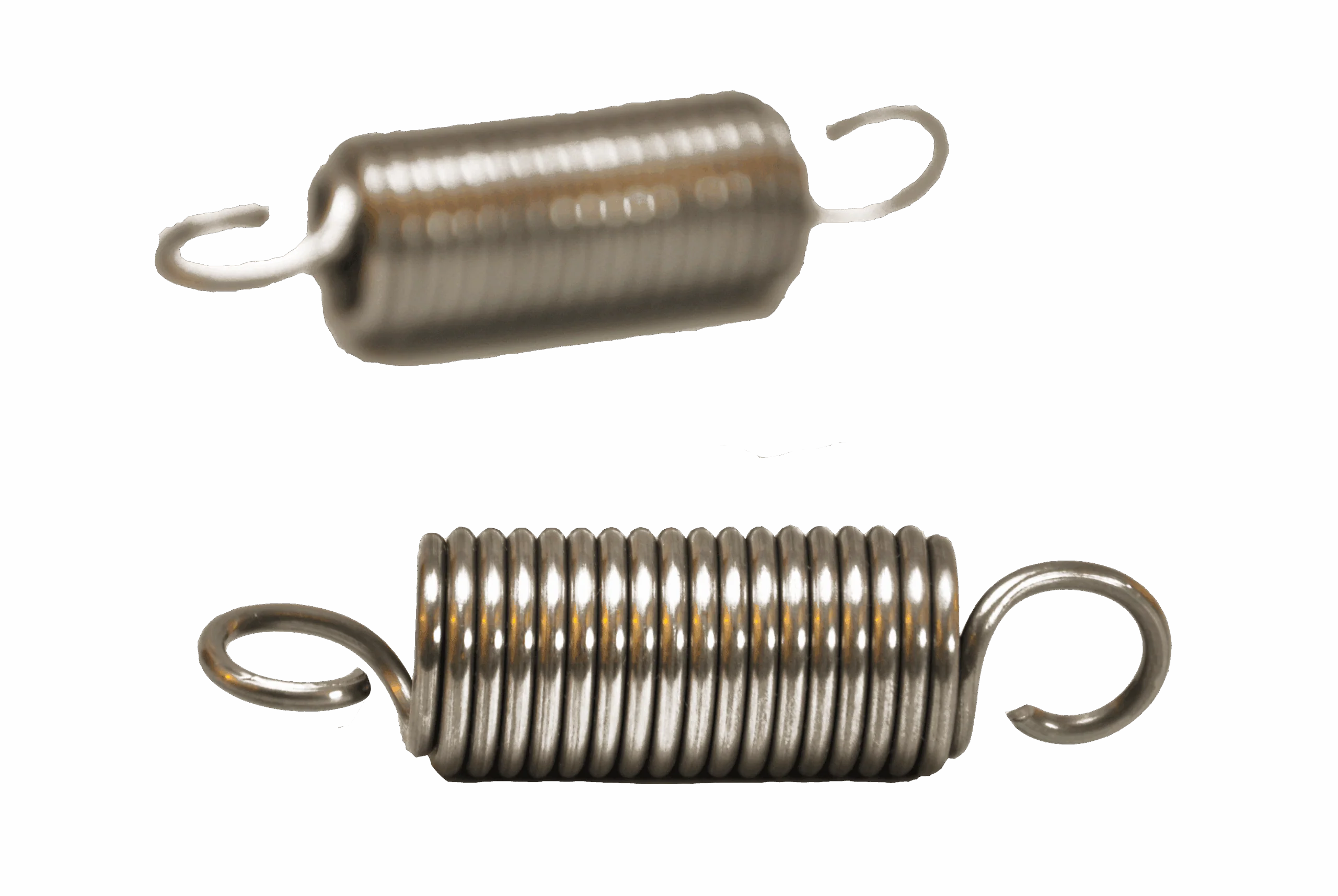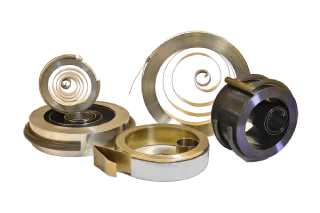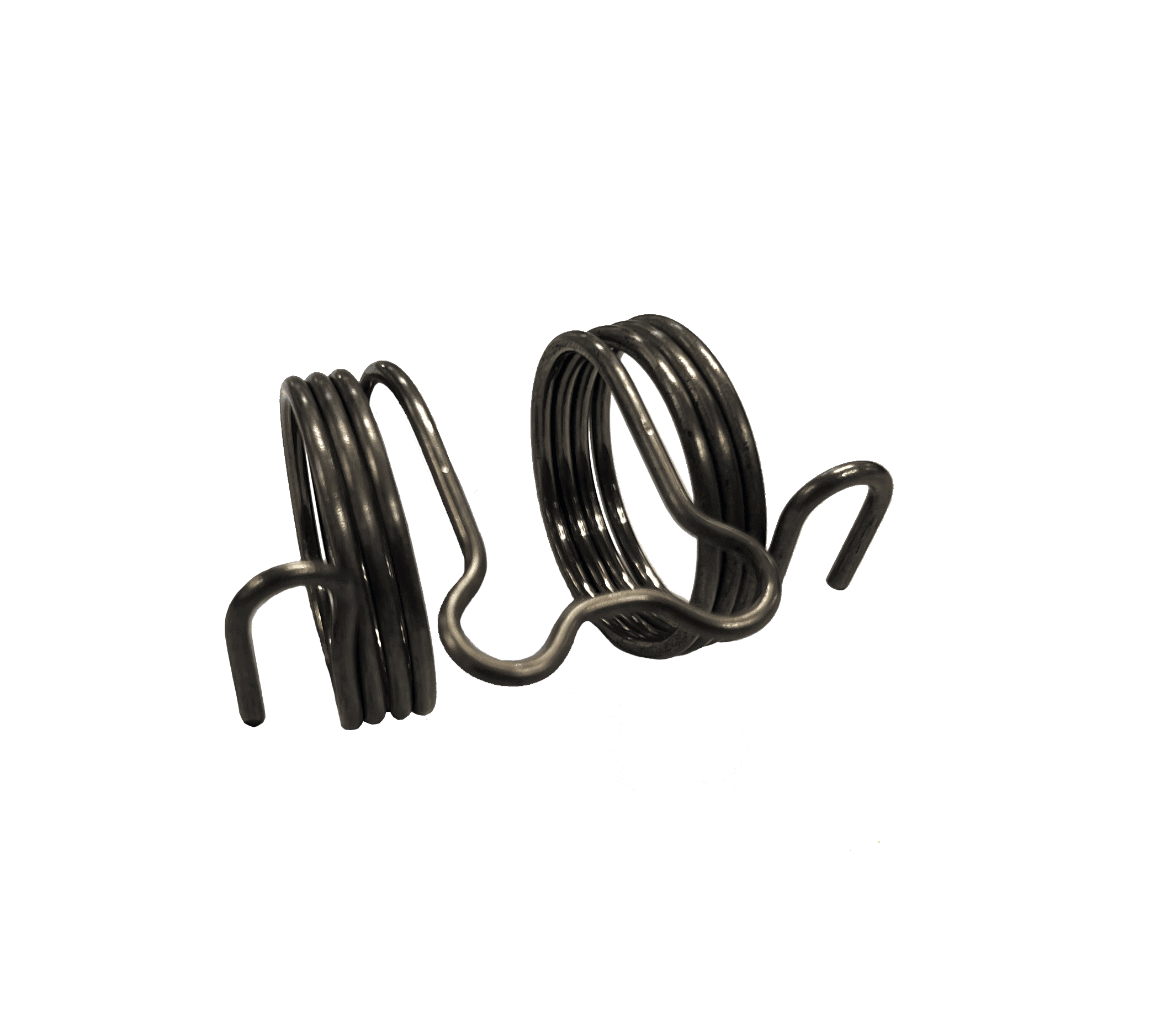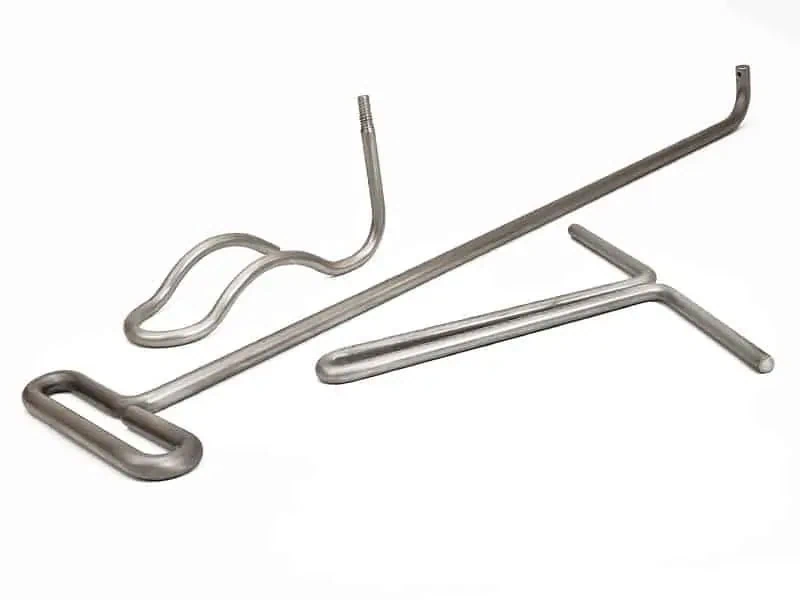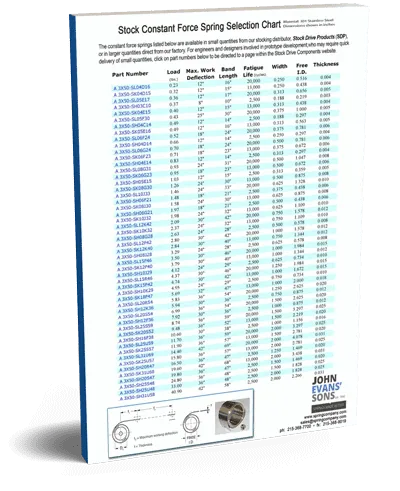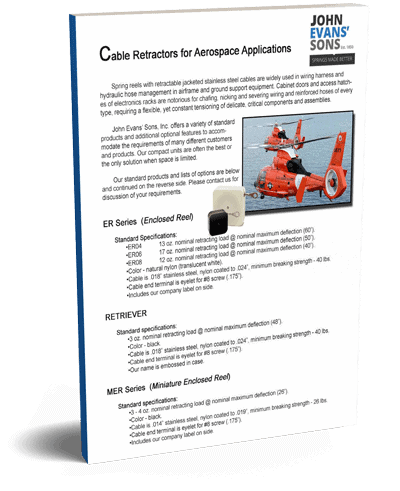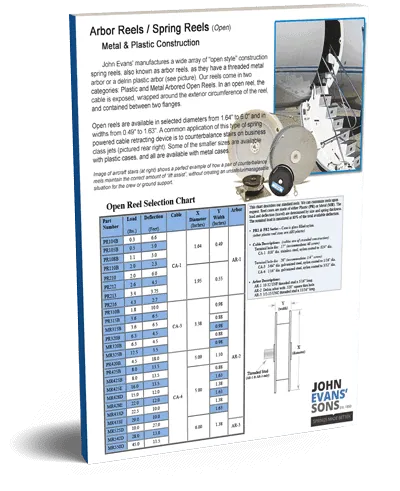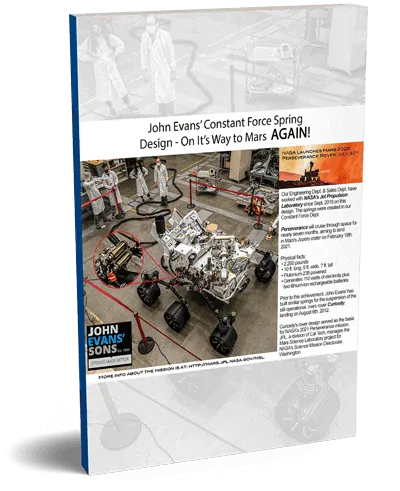In aerospace engineering, where stringent weight constraints and zero-tolerance reliability requirements define system performance, precision and consistency are critical. From high-vibration environments to extreme temperature fluctuations and space constraints, aerospace components must perform flawlessly under the most demanding conditions. Whether you’re designing flight control systems, landing gear, or advanced defense technologies, your parts must meet exacting standards for strength, weight, and longevity, without compromising safety or performance.
Experienced Aerospace Spring Manufacturers
With a proven reputation for exceptional quality and service, John Evans’ Sons is one of the world’s most trusted manufacturers of aerospace springs. We have the knowledge and expertise to handle the demanding conditions of the aerospace industry, providing our customers with reliable, high-precision springs that meet the specific needs of an application, regardless of its complexity.
Applications
Springs are also used in:
- Landing gear
- Flight control
- Aircraft doors
- Cabin seating
- Engine components
- Instrumentation
- Safety systems
- Cargo handling
- Wing flaps and slats
We offer several counterbalance options that work with aerospace equipment. There are several ways to counterbalance jet stairs or main door/stairs as shown in the image (right). Your application may also require a spring sub-assembly consisting of components from different materials. John Evans’ Sons can put together the sub-assembly with a specialty spring and customer-designated or supplied additional parts. Our ability to produce sub-assemblies is one of the reasons we stand apart from other spring manufacturers. Have a unique aerospace application that requires a spring or assembly? Provide information about your customization needs, and a member of our design engineering team can assist you.
Types of Springs
-
Compression Springs
-
Constant Force Springs
-
Custom Mechanical Assemblies
-
Extension Springs
-
Power Springs
-
Spiral Torsion Springs
-
Stampings
-
Torsion Springs
-
Vibration and Shock Isolators
-
Wire Forms
Compression Springs
These springs can store and absorb energy under compression, which is crucial for load support and shock absorption purposes.
Applications include:
- Landing gear shocks
- Seating systems
- Vibration isolation systems
Constant Force Springs
The lightweight and compact design of constant force springs provides a consistent output force, making them exceptionally well suited for aerospace systems where minimizing weight is essential.
These springs may also be arranged in a “gang” configuration—positioned side by side within a multi-spring assembly. This configuration enables the development of counterbalance forces reaching several hundred pounds to support the deployment and retraction of main entry doors, stairs, or cargo doors. In typical installations, cables exit housings within the bulkhead, allowing the spring assembly’s force to be applied at a point near the lower steps, ensuring smooth and controlled operation.
Applications include:
- Cable management systems
- Counterbalance systems
- Deployable mechanisms in satellite systems or aircraft interiors
Custom Mechanical Assemblies
Custom mechanical assemblies deliver integrated solutions that combine high-quality springs with wire forms and stamping, effectively increasing reliability while reducing assembly time.
Applications include:
- Cockpit controls
- Instrumentation
- Satellite deployment systems
Extension Springs
Extension springs are best suited for mechanisms requiring controlled extension, offering precise resistance when experiencing tension.
Applications include:
- Access panels
- Cargo bay doors
- Landing gear components
Power Springs
Power springs can maintain a small form factor while releasing and storing significant amounts of energy.
Applications include:
- Aircraft equipment storage systems
- Retraction or rewind mechanisms
Spiral Torsion Springs
Spiral torsion springs are commonly used in confined aerospace designs where controlled, precise rotational energy is required within tight packaging constraints. When paired with a lever rather than a cable assembly, these springs can deliver high torque with minimal deflection. A key advantage of spiral torsion springs is their ability to generate substantial force over a small angular movement. In the example shown, the application requires only 50 degrees of rotation to achieve the necessary counterbalance force.
Applications include:
- Adjustable seating
- Deployment mechanisms
- Flap systems
- Instrumentation
Stampings
Stampings consist of flat precision metal parts that can meet the functional or structural needs of various spring components.
Applications include:
- Avionic system mounts
- Brackets
- Control system mounts
- Shielding
Torsion Springs
Torsion springs are often used in rotating or pivoting components, providing torque during rotational motion.
Applications include:
- Aircraft control surfaces
- Door actuators
- Hinged mechanisms
Vibration and Shock Isolators
Vibration and shock isolators protect sensitive components from extreme environmental conditions, reducing the potential risk of failure and fatigue.
Applications include:
- Avionics protection
- Engine mounts
- Structural vibration damping
Wire Forms
Wire forms are custom-shaped, lightweight components used for routing or securing components in tight spaces.
Applications include:
- Clips
- Electrical routing guides
- Fasteners
Benefits
Precision-engineered springs play a vital role in the reliability, functionality, and overall performance of mission-critical systems in the aerospace industry. High-quality precision manufacturing offers the following benefits, ensuring aerospace components can withstand intense vibrations, temperature fluctuations, high altitudes, and other extreme conditions:
Working with an experienced aerospace spring manufacturer ensures full compliance with stringent industry standards, such as AS9100 and NADCAP. This reduces the risk of part rejection, delays, and costly rework – helping aerospace OEMs maintain quality assurance, regulatory approval, and supply chain reliability.
These properties are essential in aerospace applications, where components must withstand harsh atmospheric conditions, temperature fluctuations, and long service cycles.
Springs must be able to perform in harsh aerospace environments, including exposure to extreme cold, radiation, and heat. They also offer superior fatigue resistance, ensuring long-term durability in spacecraft, satellites, and aircraft.
Springs reduce wear and tear on critical flight components, extending service life. They also help protect landing gear, control mechanisms, and other avionic systems from impact forces and excessive vibration.
Performance Considerations
- Type of material. Selecting the optimal spring material maximizes strength, ensures reliability under harsh aerospace conditions, and enhances fatigue resistance in demanding operational environments.
- Material edge condition. Precise material edge conditioning is essential in aerospace applications to ensure safety, optimize performance, and prevent premature wear or failure due to stress concentration.
- Chemical agents. In aerospace applications exposed to fuels, lubricants, and harsh chemicals, choosing the correct material and protective coatings is critical to prevent corrosion and ensure component longevity.
- Temperature. Aerospace springs must reliably operate across extreme temperature variations; therefore, careful material selection and thermal design considerations are crucial to prevent thermal degradation or failure.
- Speed & acceleration. High-speed operations and rapid accelerations common in aerospace environments introduce dynamic loads, vibrations, and heat, necessitating precise spring design to mitigate wear and performance degradation.
- Stability. Ensuring spring stability in aerospace systems maintains consistent force output, withstands mechanical stresses, and safeguards structural integrity under long-term operational demands.
- Backbend. Preventing backbend in aerospace spring designs is vital to maintaining consistent force output, reducing operational noise, avoiding misalignment, and extending component life.
- Lubrication. Proper lubrication reduces friction and wear in aerospace springs, enhancing operational efficiency, reliability, and service life, particularly under continuous or repetitive movements.
- Material Thickness & Coil Diameter. Balancing material thickness and coil diameter in aerospace spring designs achieves targeted force performance and durability within strict weight and spatial constraints, critical in precision aerospace applications.
Materials
View MaterialsProduct Resources
Your Aerospace Spring Manufacturing Partner
John Evans’ Sons is a trusted aerospace spring manufacturer. All of our products align with strict quality standards. We are AS9100 certified, which is the widely adopted and standardized quality management system for the aerospace industry. This certification also includes the requirements of ISO 9001:2015.
Major corporations have recognized our quality manufacturing. Kaman Aerospace previously presented our company with its top award for outstanding quality and on-time delivery by a component vendor to a major defense contractor.
In addition, we are members of the National Business Aviation Association (NBAA), the leading organization for companies that rely on general aviation aircraft to support their business operations.
John Evans’ Sons is registered and compliant with International Traffic in Arms Regulations (ITAR).
For more information about our aerospace products and capabilities, view additional resources below. Ready to request a quote or talk with a John Evans’ Sons representative? Complete our contact form or call 215-368-7700.
Request Your Custom Constant Force Spring Design
"*" indicates required fields
